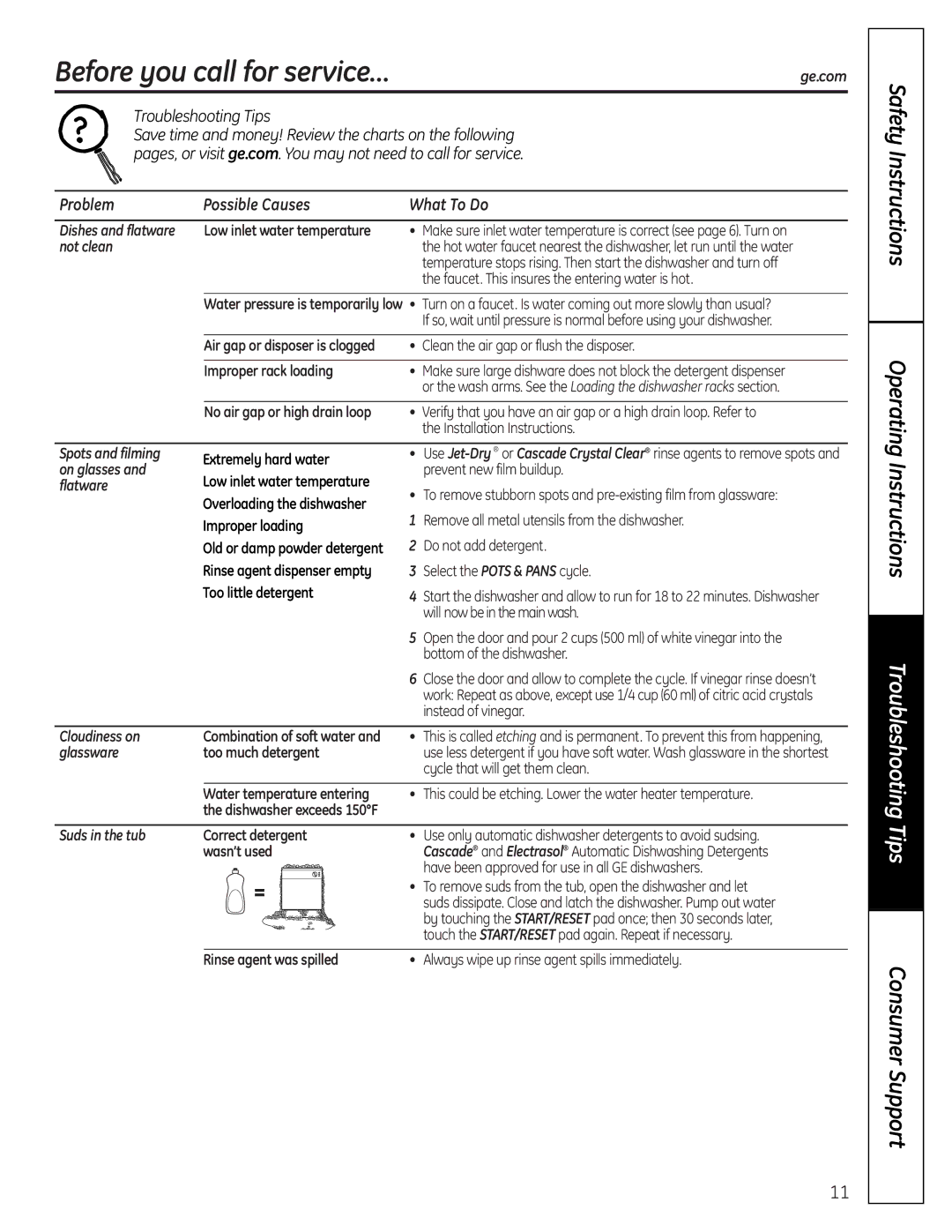
Before you call for service… | ge.com |
Troubleshooting Tips
Save time and money! Review the charts on the following pages, or visit ge.com. You may not need to call for service.
Problem | Possible Causes | What To Do | |
Dishes and flatware | Low inlet water temperature | • Make sure inlet water temperature is correct (see page 6). Turn on | |
not clean |
|
| the hot water faucet nearest the dishwasher, let run until the water |
|
|
| temperature stops rising. Then start the dishwasher and turn off |
|
|
| the faucet. This insures the entering water is hot. |
| Water pressure is temporarily low • Turn on a faucet. Is water coming out more slowly than usual? | ||
|
|
| If so, wait until pressure is normal before using your dishwasher. |
| Air gap or disposer is clogged | • Clean the air gap or flush the disposer. | |
| Improper rack loading | • Make sure large dishware does not block the detergent dispenser | |
|
|
| or the wash arms. See the Loading the dishwasher racks section. |
| No air gap or high drain loop | • Verify that you have an air gap or a high drain loop. Refer to | |
|
|
| the Installation Instructions. |
Spots and filming | Extremely hard water | • | Use |
on glasses and |
| prevent new film buildup. | |
Low inlet water temperature |
| ||
flatware | • | To remove stubborn spots and | |
| Overloading the dishwasher | ||
| 1 | Remove all metal utensils from the dishwasher. | |
| Improper loading | ||
|
|
| |
| Old or damp powder detergent | 2 | Do not add detergent. |
| Rinse agent dispenser empty | 3 | Select the POTS & PANS cycle. |
| Too little detergent | 4 | Start the dishwasher and allow to run for 18 to 22 minutes. Dishwasher |
|
|
| will now be in the main wash. |
|
| 5 Open the door and pour 2 cups (500 ml) of white vinegar into the | |
|
|
| bottom of the dishwasher. |
|
| 6 | Close the door and allow to complete the cycle. If vinegar rinse doesn’t |
|
|
| work: Repeat as above, except use 1/4 cup (60 ml) of citric acid crystals |
|
|
| instead of vinegar. |
Cloudiness on | Combination of soft water and | • | This is called etching and is permanent. To prevent this from happening, |
glassware | too much detergent |
| use less detergent if you have soft water. Wash glassware in the shortest |
|
|
| cycle that will get them clean. |
| Water temperature entering | • | This could be etching. Lower the water heater temperature. |
| the dishwasher exceeds 150°F |
|
|
Suds in the tub | Correct detergent | • | Use only automatic dishwasher detergents to avoid sudsing. |
| wasn’t used |
| Cascade® and Electrasol® Automatic Dishwashing Detergents |
|
|
| have been approved for use in all GE dishwashers. |
|
| • | To remove suds from the tub, open the dishwasher and let |
|
|
| suds dissipate. Close and latch the dishwasher. Pump out water |
|
|
| by touching the START/RESET pad once; then 30 seconds later, |
|
|
| touch the START/RESET pad again. Repeat if necessary. |
| Rinse agent was spilled | • | Always wipe up rinse agent spills immediately. |
11
Safety Instructions
Operating Instructions
Troubleshooting Tips
